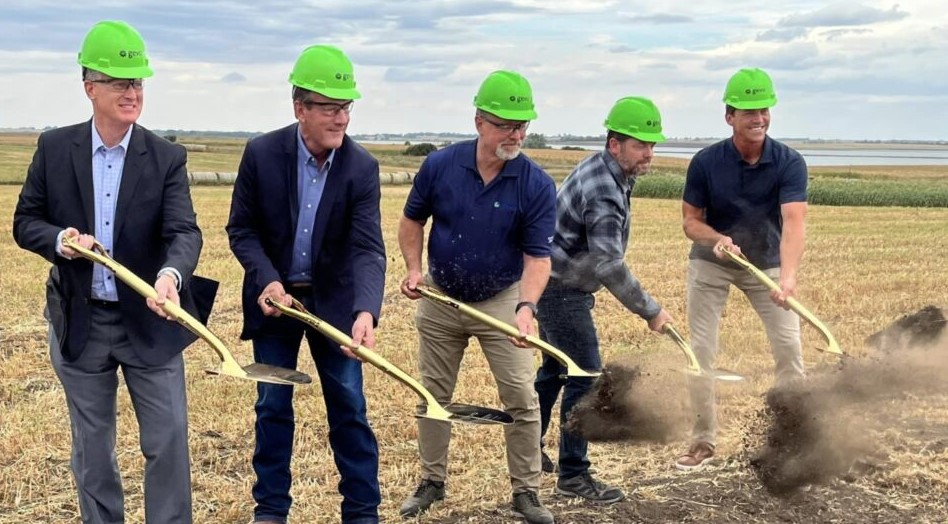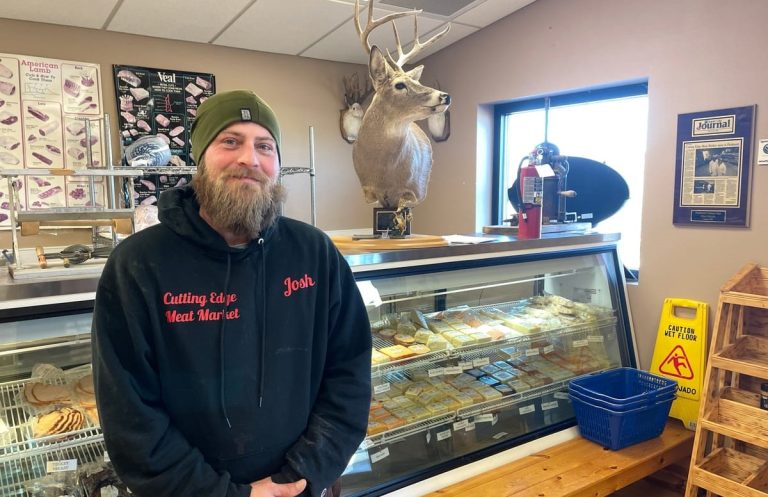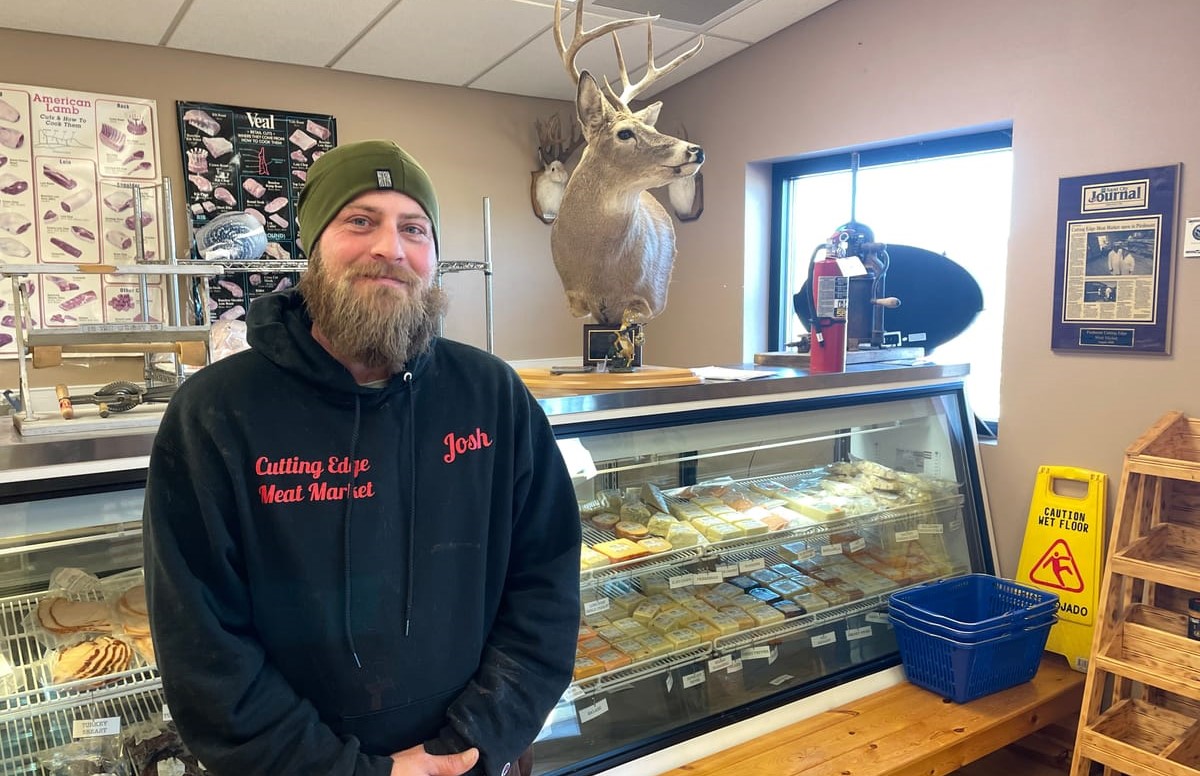PIERRE, S.D. – The largest economic development project in South Dakota history hinges on two things: a carbon pipeline and a $950 million federal loan guarantee.
If the former doesn’t happen, according to the company’s CEO, the money secured through the latter won’t land in South Dakota.
But opponents of the project and the Summit Carbon Solutions pipeline tied to it doubt the company will build in South Dakota or anywhere else.
The project in question is an approximately $1 billion sustainable aviation fuel facility in Lake Preston, dubbed “Net-Zero 1” by Gevo, the Colorado-based carbon abatement firm.
Many state leaders, including Gov. Kristi Noem, have expressed enthusiasm for Net-Zero 1. Her son-in-law, Kyle Peters, is a registered lobbyist for Gevo. Senate Majority Leader Casey Crabtree has described both the pipeline and Gevo projects as critical to the future of South Dakota’s ag industry.
Gevo secured $12.3 million in project assistance through the state’s Reinvestment Payment Plan in 2022, on top of $500,000 in incentives for water infrastructure.
Doug Sombke of the South Dakota Farmers Union isn’t as enthusiastic. He thinks Gevo’s business plan is a house of cards, built on sustainable aviation fuel tax credits that could disappear under a Republican presidential administration and uncertainty on the method the federal government will use to calculate carbon sequestration values.
“This is such a wild-ass dream it’s not even funny,” Sombke said.
In public forums and legislative hearings on pipeline-related bills, opponents have begun pointing to Gevo’s stock price to suggest that the company isn’t healthy enough to trust. It trades below $1 on the NASDAQ and has since mid-January, and has made a handful of recent lists of stocks to avoid in the business press.
“I think they’re desperate,” said Ed Fischbach, a Mellette-area farmer and vocal opponent of the pipeline and aviation fuel projects. “To be honest with you, I don’t think they’re financially stable, and they’re running out of time.”
The question of time has created a measure of desperation from pipeline opponents, as well. Lawmakers in Pierre are debating Senate Bill 201, which in its current form would offer counties per-mile payments from pipeline companies and certain landowner protections while forcing the state Public Utilities Commission to overrule “unreasonable” local ordinances that restrict pipeline siting.
Fischbach sees the bill as an attempt by lawmakers to fast-track the pipeline, and to secure Gevo’s future. SB 201 has passed the Senate and the House in different versions, and a conference committee will try to work out the differences during the final days of the legislative session next week.
“We seem to just bend over backwards and give these companies free rein, basically, to try to get them here,” Fischbach said.
Gevo: ‘bizarre questions’
In an interview with South Dakota Searchlight, Gevo CEO Patrick Gruber described the viability questions coming in from the anti-pipeline side of the aisle as “bizarre.”
Companies working in the sustainable aviation fuels business are all laboring under the reality of its nascency, in an investment environment with significant uncertainty on the regulations that will govern it.
In that space, Gruber said, Gevo is as solid as a company can be.
“We have $380 million of cash on the balance sheet,” Gruber said. “We are the most liquid company on the planet who does development like this.”
Eric Frey, Gevo’s vice president of finance and strategy, told investors in an online “fireside chat” with Water Tower Research that the company feels it’s been undervalued. He made similar statements the following week in an online presentation for Renmark Financial Communications.
Gevo isn’t the only renewable fuels company to see a drop in stock prices in recent months, Gruber said. But more importantly, the financing for Net-Zero 1 isn’t tied to Gevo’s market gains or losses. It’s a “special purpose vehicle” project, meaning it’s a separate entity for financing purposes, isolated from the company as a whole.
“It’s a different equity set, different investors. It’s infrastructure people, along with us,” Gruber said. “Our stock price is actually irrelevant.”
Gruber and others see sustainable aviation fuel as an inevitability in a world that increasingly values carbon dioxide abatement to reduce emissions of the heat-trapping gas into the atmosphere.
Airlines have made commitments to purchase sustainable fuel as an offset to their carbon footprints. The Biden administration wants to see 400 billion gallons mixed with conventional jet fuel by 2030, and the Inflation Reduction Act lays out per-gallon payments for it, based on carbon score calculations that have yet to be finalized.
Sustainable aviation fuel is produced now, but is sold by just two U.S. companies and represents 0.1% of all jet fuel, with 15.8 million gallons produced in 2022.
At the moment, it is only produced using beef tallow or discarded oil. The Inflation Reduction Act has incentives meant to encourage the production of 3 billion gallons by 2030.
Gruber calls ethanol-to-jet fuel the clearest, most cost-effective source path to a production ramp up: the infrastructure is in place, the product works and corn is abundantly available.
Ethanol as a starting point wins on price and practicality, he said, and “it’s by a lot.”
Lower carbon intensity, higher growth potential
The “threat” to leave South Dakota, Gruber said, is just economic reality.
The project’s federal financing is tied directly to Gevo’s ability to push down the carbon score of its product.
To get the federal loan and a return on investment, Gevo needs to take full advantage of the carbon abatement dollars made available through federal and state governments.
Every point below 50 on a 100-point carbon intensity scale is worth money. Gevo has committed to fuels that score zero, but Gruber told lawmakers during a virtual listening session on Monday that they can get to -30 or lower, and produce a fuel that can compete in price with conventional jet fuel.
Cutting the carbon score is the reason Gevo picked Lake Preston: 71% of the area’s farmers use sustainable practices like no-till agriculture, which could translate to a lower carbon score for its corn. It’s why Gevo founded a company called Verity to track and verify carbon scores from corn plant to final product through on-farm data collection.
It’s also why Gevo aims to build a wind farm near its plant: Turning ethanol into jet fuel is energy intensive – too intensive to turn out a low-carbon product without a renewable energy source.
All those factors are part of securing the $950 million federal loan guarantee, which Gevo first sought last August and expects to have by the end of this year.
But without a carbon capture pipeline to further drive down the carbon intensity score, Gruber said, the company wouldn’t get that guarantee. Carbon emissions from the plant would be captured, placed in the pipeline and transported to North Dakota for underground sequestration, along with emissions from numerous ethanol plants in multiple states.
There are “lots of states” more committed to carbon abatement than South Dakota, and some where sequestration can happen without a pipeline.
“Make no mistake, I am going to get a project financed,” Gruber said.
He doesn’t want to leave South Dakota. By the end of this year, he expects the company will have pumped $200 million into the Lake Preston project.












